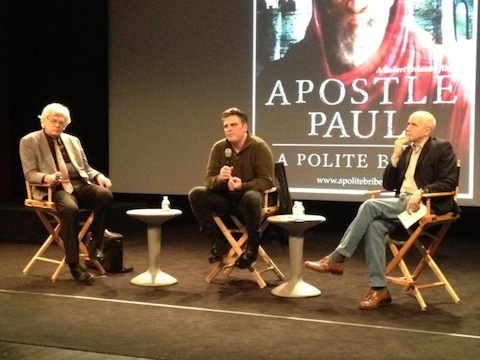Inerrancy, literalism, or unexamined belief in the Bible, why does Fundamentalism still have a strong hold on so many Christians today? For many "bible believers" the answer would be, because God gave us the Bible, duh? Bible studies on Monday and Wednesdays, Bible on TV, Bible on line, devotional hours, inspiration books, there's a lot of bible study going on, right? Well, actually, no.
As my film (and book) Apostle Paul: A Polite Bribe has found an audience with the mainstream faiths, those appreciative of Paul's human drama at the heart of the divine story, rarely has a Fundamentalist "reviewed" the film. Most Evangelicals will differentiate themselves from Fundamentalists, yet according to Mark Noll, in his work, The Scandal of the Evangelical Mind states, "despite popular success at the popular level, modern Evangelicals have failed notably in sustaining serious intellectual life." Yet, Noll's Evangelicals or mainstream Christians, are still a far cry from the Fundamentalist most threatened by a critical study of Paul's letters, quick to assign suspicious motives to the well established research, but for what reason? In order to answer this question, we need to dig a bit deeper into the nature of Fundamentalism itself.
Fundamentalism as a phenomenon has its roots in Reformed (Calvinist and Puritan) thinking that in the 20th century needed to defend the "Fundamentals, " -- as they were called -- against the modern Christian critique. One could revisit the famous John Gresham Machen (Princeton Theological Seminary) historical dialogue with Adolf Harnack (Union Theological Seminary) over these very subjects. Later Machen, would break off from Princeton and start Westminster Seminary that until today holds to an inerrantist view. Yet, even Machen's Fundamentals were a far cry from the "bible without errors" voiced today. Machen wrote "There are many, who believe that the Bible is right at the central point, in its account of the redeeming work of Christ, and yet believe that it contains many errors, such men are not really liberals, but Christians because they have accepted as true the message upon which Christianity depends."
A Bible defense in light of 16th Catholic abuses that understandably caused the Reformation (sola scriptura) to justify a scriptural bulwark against the Papacy, but what about the 21st century? While many hold transcendent ideas of the Bible, no one would argue that the Sun revolves around the Earth, or that sickness comes from demon possession. So why, in the case of scientific Bible study, would it still be so threatening? The answer to that question is that Fundamentalism it is not about science or study at all. As Catholic author Karl Keating explains in his Catholicism and Fundamentalism, "fundamentalists accept the Bible as inspired, because the Bible can be taken as rule of faith only if it is first held to be inspired and inerrant."
Also Fundamentalism derives power not from honest inquiry, but from how deeply it taps into collective needs and discontents of those who believe. As a result we are living in a fundamentalist America with the collective psyche remains largely unaware of the basic facts of biblical teaching. A phenomenon revealed in the Fundamentalist selective devotional readings such as: Jesus is love, yet the bible says he came with a sword to divide people. Jesus is the savior of the world yet he says "I was sent only to the lost sheep of the house of Israel" (Mathew 15:24). And the fact that the strongest thrust of Christian mission came not from Jesus (or his followers), but from the Apostle Paul, an outsider met by great opposition, the theme explored in Apostle Paul: A Polite Bribe.
Fundamentalism is not unique to Christianity, or religion in general, but is an anti intellectual phenomenon found in all systems of belief, religious or secular. The 20th century conjured up Hitler as pagan cult figure, and Stalin, the former seminarian, as missionary against Capitalism. Modern divine Caesars deemed by God to be rulers of the utopian state. Unabashedly their first steps in governance were to eliminate those armed with the weapons of free reason that might be turned on the regime itself. In other words, blind ideology (faith) good, critical thinking bad.
While no dictatorial regime Fundamentalist thought does psychologically imprison many in an unverifiable tautology -- always a sign of an argument's weakness -- that claims, only after you have faith, will you see the evidence of your belief. And if you still don't "realize" it then, it is because your (sinful) lack of faith prevents you from knowing, and around and around we go. Nothing outside this fixed loop can penetrate or end the closed cycle entranced with certainty, and avoid the messiness of human reason. A selective truth not according to evidence, but to what psychological "assures." In the end, the argument is simply, "I know because I know."
Finally, modern fundamentalism is not the legacy of classic Christianity, but more the prodigal son, who without the responsibilities of reason, seeks a wishful path to the divine. All is heavenly and it is only a matter of time, when the world will see the divine truth. Jesus was a man, but -- wink wink -- not really. Paul and the other Apostles were men, but -- wink wink -- above such petty needs as honor, ethnic identity, or -- God forbid -- money. In the end, a Fundamentalist rejection of our critical faculties leaves only a contrived hope based not on a historical death or resurrection but on the desire to believe itself - faith in faith.
Not a point of view in a post Sep 11th world that should go unchallenged, I think.

